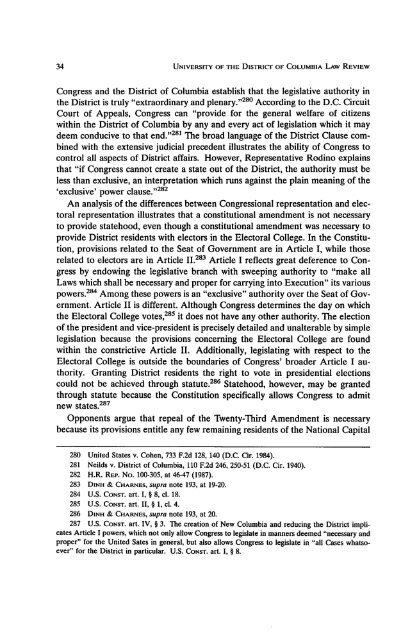Download - UDC Law Review
Download - UDC Law Review
Download - UDC Law Review
You also want an ePaper? Increase the reach of your titles
YUMPU automatically turns print PDFs into web optimized ePapers that Google loves.
34 UNIVERSITY OF THE DISTRlcr OF COLUMBIA LAW REVIEWCongress and the District of Columbia establish that the legislative authority inthe District is truly "extraordinary and plenary.,,28o According to the D.C. CircuitCourt of Appeals, Congress can "provide for the general welfare of citizenswithin the District of Columbia by any and every act of legislation which it maydeem conducive to that end. ,,281 The broad language of the District Clause combinedwith the extensive judicial precedent illustrates the ability of Congress tocontrol all aspects of District affairs. However, Representative Rodino explainsthat "if Congress cannot create a state out of the District, the authority must beless than exclusive, an interpretation which runs against the plain meaning of the'exclusive' power clause."282An analysis of the differences between Congressional representation and electoralrepresentation illustrates that a constitutional amendment is not necessaryto provide statehood, even though a constitutional amendment was necessary toprovide District residents with electors in the Electoral College. In the Constitution,provisions related to the Seat of Government are in Article I, while thoserelated to electors are in Article 11.283 Article I reflects great deference to Congressby endowing the legislative branch with sweeping authority to "make all<strong>Law</strong>s which shall be necessary and proper for carrying into Execution" its variouspowers. 284 Among these powers is an "exclusive" authority over the Seat of Government.Article II is different. Although Congress determines the day on whichthe Electoral College votes,285 it does not have any other authority. The electionof the president and vice-president is precisely detailed and unalterable by simplelegislation because the provisions concerning the Electoral College are foundwithin the constrictive Article II. Additionally, legislating with respect to theElectoral College is outside the boundaries of Congress' broader Article I authority.Granting District residents the right to vote in presidential electionscould not be achieved through statute. 286 Statehood, however, may be grantedthrough statute because the Constitution specifically allows Congress to admitnew states. 287Opponents argue that repeal of the Twenty-Third Amendment is necessarybecause its provisions entitle any few remaining residents of the National Capital280 United States v. Cohen, 733 F.2d 128, 140 (D.C. Cir. 1984).281 Neilds v. District of Columbia, 110 F.2d 246, 250-51 (D.C. Cir. 1940).282 H.R. REP. No. 100-305, at 46-47 (1987).283 DINH & CHARNES, supra note 193, at 19-20.284 U.S. CONST. art. I, § 8, c1. 18.285 U.S. CONST. art. II, § 1, c1. 4.286 DINH & CHARNES, supra note 193, at 20.287 U.S. CONST. art. IV, § 3. The creation of New Columbia and reducing the District implicatesArticle I powers, which not only allow Congress to legislate in manners deemed "necessary andproper" for the United Sates in general, but also allows Congress to legislate in "aU Cases whatsoever"for the District in particular. U.S. CONST. art. I, § 8.














